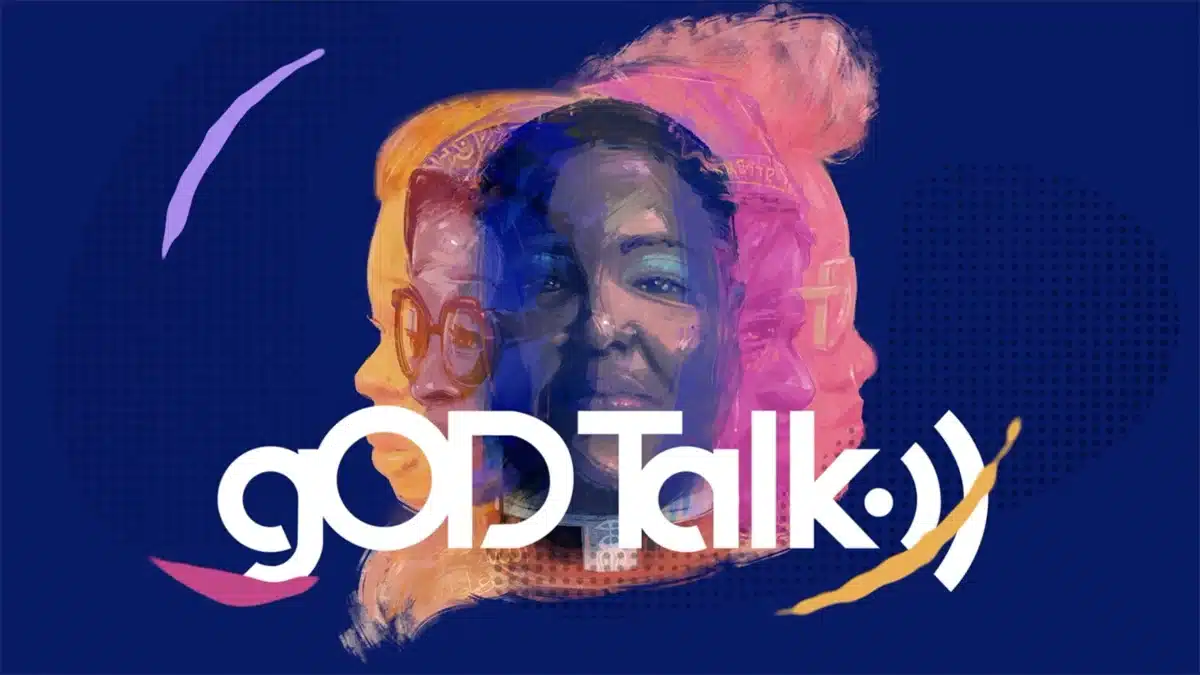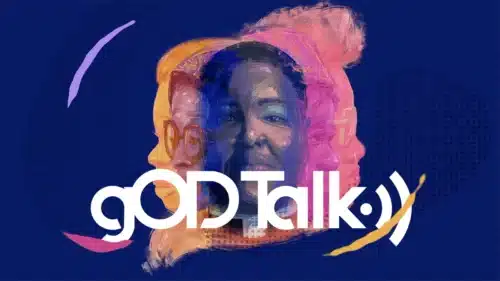
(RNS) — A member of the second-oldest Black Catholic order in the United States.
A voodoo priestess.
A gay atheist woman.
A new documentary from the National Museum of African American History and Culture explores the range of faith and spiritual expressions of Black millennials and the choices they have made to reject — or embrace — the religious rituals of their childhood.
Teddy Reeves, the creator and producer of “gOD-Talk: A Black Millennials and Faith Conversation,” said the documentary shows that the term “nones” — used by academics and journalists to describe people without a particular religious affiliation, often of younger generations — frequently does not apply to this demographic of Black people born between 1981 and 1996.

gOD-Talk. (Image by Nikkolas Smith)
In a Monday (Oct. 23) interview after the film’s weekend premiere at the downtown Washington museum, he said the two-hour documentary, a product of the museum’s Center for the Study of African American Religious Life in partnership with the Pew Research Center, aims to give voice to the people of this generation and let them identify themselves.
“We show the pluralistic nature of the African American religious experience,” Reeves told Religion News Service, “from those who are of some formal faith tradition to those who are not.”
And from those who are somewhere in between, the ones who say “’I’m Christian-ish’ to those who say, ‘I am a spiritualist. I’m just finding my way,’” said Reeves.
“So we tried to make sure that we show that breadth.”
Though the traditions vary widely and Black millennials are less religious than older Black Americans, Pew’s research found that the vast majority — 96% — still say they believe in God or a higher power.
The documentary includes critiques of the traditional Black church, with featured speakers describing what it was like to grow up with a single parent who was chastised by the church or adults who scolded them for views or behavior deemed immoral by congregational leaders.
“I grew up in a faith context that basically told me that if my mother obeyed and loved God more, I wouldn’t be here,” said Candice Marie Benbow, a self-identified “seeker.” She described how her mother took refuge in a church where they were “able to live and thrive” after an earlier one sought an apology from her during her unwed pregnancy with Benbow. The author and theologian nevertheless also describes herself as “Baptist born, Baptist bred, when I die I’ll be Baptist dead.”
Benbow also is an occasional columnist for RNS.
Tre’vell Anderson, an entertainment journalist who identifies as “a nonbinary person of trans experience,” recalled growing up in a Pentecostal church where being gay was considered a sin and becoming the subject of a special “after-church” ceremony.
“I remember them turning lights down low, lighting some candles and there being a prayer, a massive prayer situation about me,” said Anderson, who is described in the documentary as “Christian-ish.”
As Reeves relies on Pew data that shows Black millennials’ continuing connections to spiritual matters, he compares the stances of some of them to the work of Protestant reformer Martin Luther — but notes millennials’ concerns are wider than institutional Christianity.
“They’re not walking away from the belief in something greater than themselves,” he said. “They’re walking away from institutions. And so that, for us, is something for us to begin to grapple with as we think about the longevity and sustainability of our religious institutions in this country.”
The documentary’s more than 100 images — drawn from the museum and from the wider Smithsonian collections — often feature the traditions of the Black church, from the dimpled young usher passing out church fans to a choir processing down a center aisle. But the film also includes depictions of non-Christian traditions, such as mystic Tamil Jones using tarot cards and lighting sage or former Baptist Rashid Hughes practicing mindfulness and yoga.
Hughes was among the three dozen featured speakers in the film and described the need to find himself in a practice different from his childhood faith, even as he had “deep fear” of losing the community that helped raise him.
“There was a part of me that recognized that I was really used to and familiar with exploring the questions of like: Who is God? What is God? But I wasn’t as familiar with the question of who am I?” he said. “And when I really got introduced to kind of Buddhist practices and mindfulness practices, what that provided for me was a moment to let go of the seeking, the constant striving, the laboring, to kind of get God closer to me.”
Reeves, 37, an ordained minister in the Progressive National Baptist Convention who describes himself as a “wisdom seeker,” said he expects the audience for the film will not solely be African Americans or people who live in the U.S.
“We had individuals who attended the premiere who were not Black and they were saying the same thing,” he said. “White Jewish temples are struggling just as much as Black Christian spaces are struggling to get young people to come beyond High Holy Days.”
The film is set to screen at the annual meetings of the American Academy of Religion and the Society of Biblical Literature in November, and museum officials plan to show it more widely next year in this country and in Europe.
“gOD-Talk” was a finalist in the documentary category at the Charlotte Black Film Festival in July. Festival founder Tommy Nichols said in an interview that the film provided a warning to many modern-day congregations.
“They’re not engaging the voice of millennials, or Gen Z,” Nichols said. “I believe that the documentary was a great tool to awaken the church about the need to have young voices, as part of the voices coming out of the pulpit, as part of the voices helping make policy and the direction of the church as we go forward in this digital society.”






